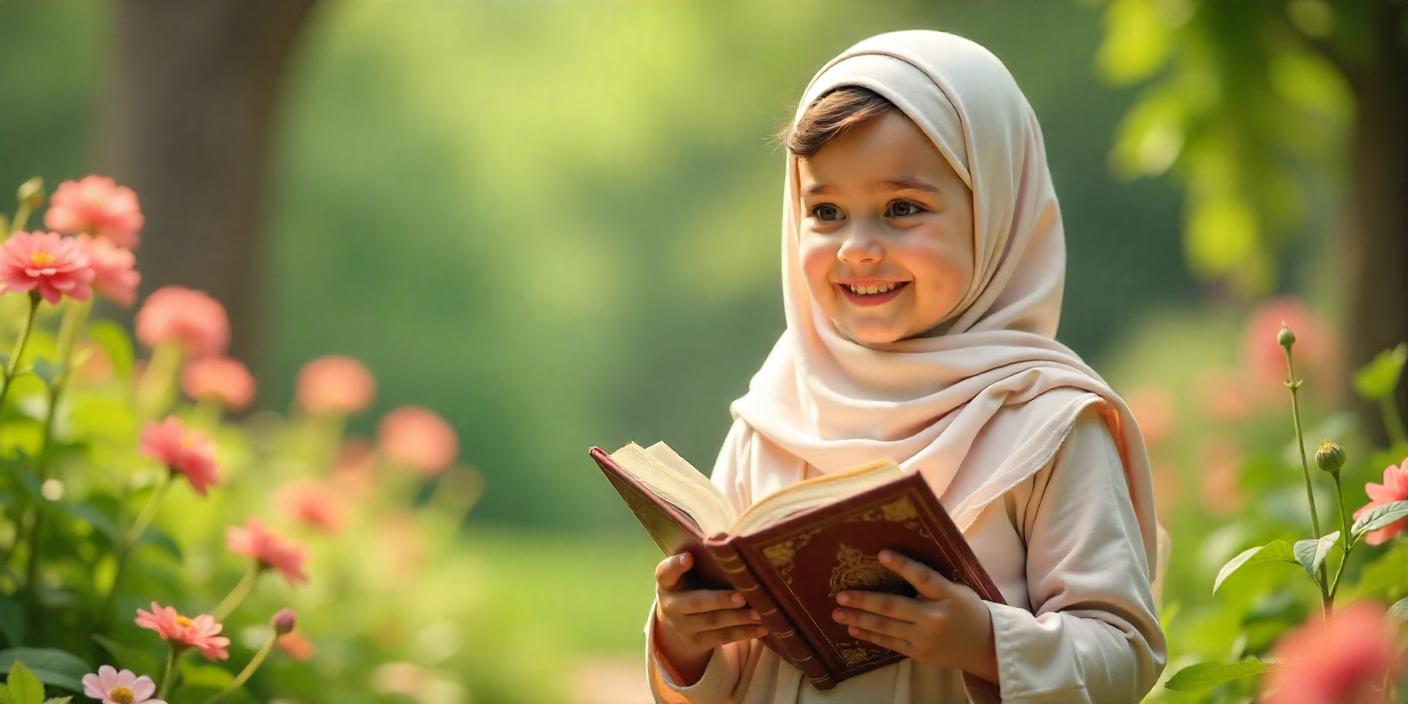In Islam Every Day is Daughter Day.
Celebrated in various nations to recognise daughters and their importance in families, National Daughters Day is a modern, secular holiday. Even though it’s not an Islamic religious holiday, considering it in the context of Islam can help us understand how much value Islam places on daughters and how important it is to treat them with respect and love. In Islam every day is Daughter day.
There isn’t a particular religious day in Islam that is only for girls. Nonetheless, Islam places a great emphasis on daughters and stresses their rights, value, and place in the family and community. It was highly valued by the Prophet Muhammad (peace be upon him) to nurture and care for daughters. He is reputed to have declared that Paradise would be awarded to anyone who raises girls well.
Honouring the Islamic Blessing of Daughters
A unique opportunity to honour and appreciate the amazing daughters in our life is National Daughter’s Day. Despite being celebrated on different dates in different nations, this day offers a chance to consider the benefits of having daughters, their social worth, and the obligations parents have to them. Daughters are considered a great blessing and a source of happiness in Islam, and their position is much valued. The importance of girls in Islam, the lessons found in the Quran and Hadith about them, and the methods Muslim families can honour and raise their daughters will all be covered in this article.
The Islamic Value of Daughters
Islamic teachings place a great importance on daughters and stress the benefits and rewards of being a parent them. In contrast to other societies in the past, having a daughter is not a cause for shame. On the contrary, daughters’ upbringing is highly valued in Islam, and the Quran and Hadith both offer them substantial acknowledgement for their rights.
A Blessing and a Mercy from Allah
The birth of a daughter in Islam is regarded as a blessing from Allah. In the Quran, Allah (SWT) mentions the birth of daughters as a sign of His mercy. In Surah Al-Shura (42:49), Allah says:
“To Allah belongs the dominion of the heavens and the earth. He creates what He wills. He bestows female children upon whom He wills, and He bestows male children upon whom He wills.”
(Quran 42:49)
This verse serves as a clear reminder that daughters are gifts from Allah, just like sons. In Allah’s view, both sexes are equally valued. Raising a daughter is viewed as a chance for spiritual development and reward in the hereafter.
Daughters as a Paradise Source
In several Hadiths, Prophet Muhammad (PBUH) specifically highlighted the immense reward for parents who raise their daughters with kindness, compassion, and care. One of the most famous sayings of the Prophet Muhammad (PBUH) is:
“Whoever has two daughters, and he provides for them, treats them kindly, and does not show favoritism, will be with me in Paradise.”
(Sahih Bukhari)
This hadith emphasises how crucial it is to show girls respect and affection. The Prophet (PBUH) emphasised that daughters’ emotional and physical health is a way to receive a lot of rewards in the Hereafter.
Taking Care of and Protecting Daughters
Another key teaching in Islam is the importance of safeguarding the dignity and safety of daughters. In the pre-Islamic era, there was a practice of female infanticide, where daughters were buried alive because they were perceived as a source of shame. Islam abolished this cruel practice and condemned it in the strongest terms. In Surah An-Nahl (16:58-59), Allah mentions:
“And when one of them is given the good news of a female (child), his face becomes dark, and he is filled with inward grief. He hides himself from the people because of the evil of what he has been told. Will he keep it with disgrace or bury it in the ground? Unquestionably, evil is what they decide.”
(Quran 16:58-59)
These verses demonstrate that daughters should be protected, loved, and cared for rather than treated with disrespect or disgrace. Islam advises parents to raise their daughters with honour and respect, and the Quran forbids treating them badly in any way.
The Parental Role in Daughter Raising
Raising a daughter in an Islamic household is a responsibility that comes with great rewards. The Quran and Hadith emphasize the importance of kindness, education, and emotional nurturing in the upbringing of daughters.
- Providing Education
For both boys and girls, education is highly valued in Islam. According to the Prophet Muhammad (PBUH),
“Seeking knowledge is obligatory upon every Muslim.”
(Sunan Ibn Majah)
According to this hadith, gender is not a barrier to education. It is the duty and right of both boys and girls to pursue knowledge. For girls’ personal development and empowerment, it is crucial to raise them with knowledge of their rights in society. It’s important for parents to give their girls the chance to grow intellectually, socially, and spiritually.
Promoting Social and Emotional Growth
In addition to schooling, parents should support their daughters’ mental health. Daughters are urged to develop their compassion, faith, and morals in the Islamic culture. The Prophet Muhammad (PBUH) set an example for raising strong, self-assured, and caring girls by treating his daughters with the highest love and respect.
Parents ought to work to boost their daughters’ self-esteem, educate them the importance of each person, and support them in forming wholesome bonds based on respect and understanding.
Encouraging Acts of Kindness and Charity
Islam also encourages daughters to perform deeds of kindness and charity. According to the Prophet Muhammad (PBUH),
“The best of you are those who are the best to their women.”
(Sunan Ibn Majah)
This hadith emphasises how crucial it is to treat women—including daughters—with kindness, decency, and respect. Daughters should be encouraged by their parents to be active members of society, give back to their communities, and assist those in need in ways that uphold the virtues of compassion and kindness.
Conclusion
A lovely time to consider the importance of daughters in our lives is National Daughter’s Day. Daughters are seen as precious, fortunate, and deserving of affection and attention in Islam. They should be protected, respected, and educated since they are a source of happiness. Muslim parents can raise daughters who are strong, self-assured, and kind by adhering to the principles of the Quran and Hadith. Let’s honour and value our daughters on this day by providing them with presents as well as by fostering their academic, emotional, and spiritual development.
FAQs.
What is the status of daughters in Islam?
In Islam, daughters is queen and highly valued and regarded as a blessing. The Quran and Hadith provide numerous references that show the special status of daughters. They are seen as a source of joy, mercy, and reward. Islam emphasizes the love, care, and respect owed to daughters. The birth of a daughter is not something to be ashamed of, as it was in some pre-Islamic cultures.
What is spoken about daughters in the Quran?
The Quran recognizes daughters as gifts from Allah and emphasizes their rights. For instance, in Surah Ash-Shura (42:49), Allah says
“To Allah belongs the dominion of the heavens and the earth. He creates what He wills. He bestows female children upon whom He wills, and He bestows male children upon whom He wills.”
What did the Prophet Muhammad (PBUH) say about daughters?
Prophet Muhammad (PBUH) emphasized the great reward and honor for parents who raise daughters with care and kindness. He said
“Whoever has two daughters, and he treats them with kindness, they will be a shield for him from the Hellfire.”
(Sahih Bukhari)
What are the rights of daughters in Islam?
Islam grants daughters various rights, including:
Right to inheritance: Daughters are entitled to inherit from their parents, although their share is half of what a son would receive. This is due to the financial responsibilities that men are required to bear in Islamic law. Nonetheless, the inheritance of daughters is a right that must be honored.
Right to education: Islam places great emphasis on the education of both boys and girls. The Prophet Muhammad (PBUH) said:
“Seeking knowledge is obligatory upon every Muslim, male and female.”
(Sunan Ibn Majah)
Right to respect and dignity: Daughters are to be treated with respect and should not be discriminated against based on their gender. Islam forbids practices like female infanticide, which was prevalent in pre-Islamic times.
Does Islam support daughters’ education?
Yes, Islam highly encourages the education of both boys and girls. The Prophet Muhammad (PBUH) said:
“The seeking of knowledge is obligatory upon every Muslim (male and female).”
(Sunan Ibn Majah)
Muslim girls are encouraged to learn about everything from science and the arts to religious studies. It is believed that education is crucial to women’s empowerment and to their ability to make constructive contributions to society.
How does Islam view the marriage of daughters?
In Islam, the marriage of a daughter is a significant event, and her consent is paramount. It is not permissible to force a daughter into a marriage against her will. The Quran states in Surah An-Nisa (4:19):
“O you who have believed, it is not lawful for you to inherit women by compulsion…”
(Quran 4:19)
Can daughters contribute to society according to Islam?
Yes, Islam encourages daughters to contribute to society in positive and meaningful ways. Islam does not restrict women, including daughters, from participating in various activities like education, work, charity, and leadership roles. Daughters are encouraged to use their knowledge and skills to benefit the community and follow the path of righteousness.

